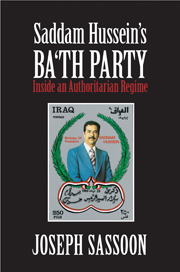Book contents
- Frontmatter
- Contents
- List of Figures and Tables
- Acknowledgments
- Note on Transliteration
- List of Abbreviations
- Glossary
- Map
- Introduction
- 1 The Rise of the Baʿth Party
- 2 Party Structure and Organization
- 3 The Baʿth Party Branches
- 4 Security Organizations during the Baʿth Era
- 5 The Baʿth Party and the Army
- 6 The Personality Cult of Saddam Hussein
- 7 Control and Resistance
- 8 Bureaucracy and Civil Life under the Baʿth
- Conclusion
- Appendix I Chart of the Structure of the Baʿth Party Secretariat (maktab amanat sir al-qutr)
- Appendix II Baʿth Party Statistics as of September 2002
- Notes on Sources
- Bibliography
- Index
- References
2 - Party Structure and Organization
Published online by Cambridge University Press: 05 June 2012
- Frontmatter
- Contents
- List of Figures and Tables
- Acknowledgments
- Note on Transliteration
- List of Abbreviations
- Glossary
- Map
- Introduction
- 1 The Rise of the Baʿth Party
- 2 Party Structure and Organization
- 3 The Baʿth Party Branches
- 4 Security Organizations during the Baʿth Era
- 5 The Baʿth Party and the Army
- 6 The Personality Cult of Saddam Hussein
- 7 Control and Resistance
- 8 Bureaucracy and Civil Life under the Baʿth
- Conclusion
- Appendix I Chart of the Structure of the Baʿth Party Secretariat (maktab amanat sir al-qutr)
- Appendix II Baʿth Party Statistics as of September 2002
- Notes on Sources
- Bibliography
- Index
- References
Summary
The development of the Baʿth Party's apparatus during its thirty-five-year rule enabled it to survive intraparty struggles, two devastating wars, a period of severe sanctions, and major battles against the Kurds and the Shiʿis during the intifada of 1991. As the long arm of Saddam Hussein, the party became an impressive and formidable organization that played a central role in sustaining the power of the regime. In its structure, membership, and recruitment, and in its political education campaign, the Baʿth Party was characteristic of ruling parties in other tyrannical regimes.
The Party Structure
The Baʿth Party played a crucial role in decision making in Iraq, and in many ways its structure was similar to that of the Communist Party in the Soviet Union. Both societies could be termed mono-organizational, because all activities were run by hierarchies of appointed officials under a single command. As the Baʿth Party expanded in size and governing responsibilities, bureaucratization became critical for its success. Baʿth documents clearly show that there was an elaborate division of labor and, like the Soviet system, goals and decisions were formulated at the apex of the pyramid, so that “organizational success depends on each participant precisely performing his tasks as prescribed, without his needing to understand the system as a whole or even support its goals.” This was important, given that Iraq officially became a Baʿthist country after the party came to power in 1968:
We have to emphasize that this society is led by a party, and that party is the Arab Baʿth Socialist Party…which leads [the people] in its values, its organizations, and also leads it in its ideas and its policies.…Thus it is necessary that the party's values and ideologies are at the forefront of these activities, and throughout the country's decision-making apparatus.
- Type
- Chapter
- Information
- Saddam Hussein's Ba'th PartyInside an Authoritarian Regime, pp. 34 - 70Publisher: Cambridge University PressPrint publication year: 2011



